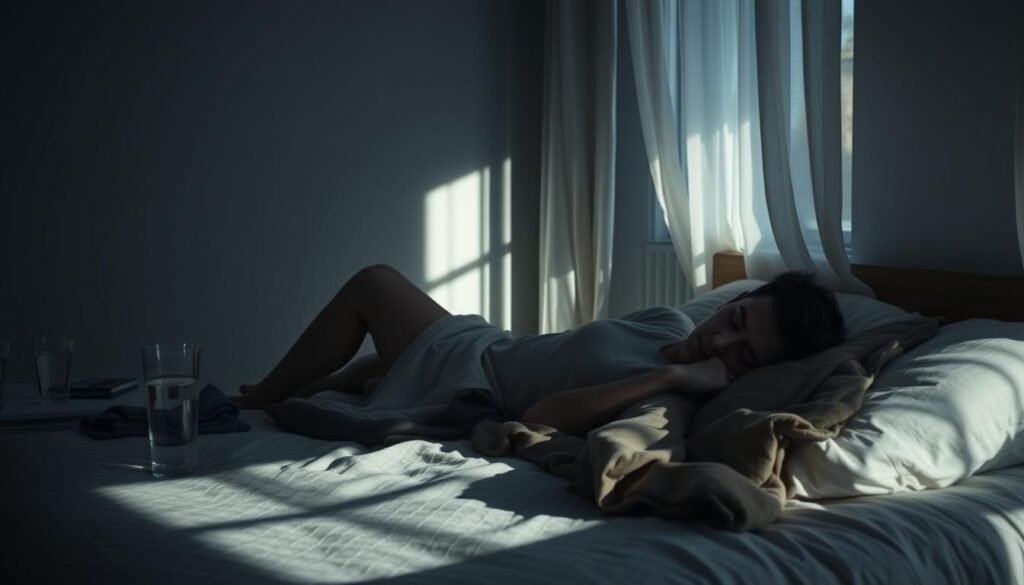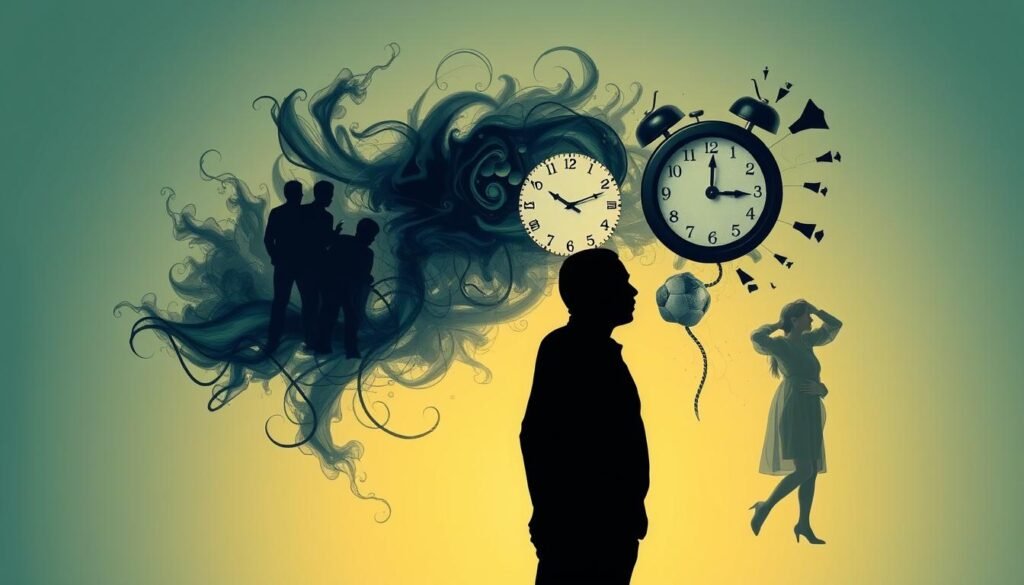Did you know up to 90% of cancer patients feel very tired during treatment? This is especially true for those getting radiation therapy. Fatigue from this therapy can stretch out, making everyday activities hard even after treatments end. Many people and their families want to know how long this fatigue will last and what can be done about it.
Radiation-induced fatigue (RIF) is a type of extreme tiredness that comes with cancer radiation therapy. This article will talk about what causes this fatigue, how long it might last, and ways to handle it. The goal is to help patients and their loved ones deal with this side effect better. For tips on dealing with treatment fatigue, see: Managing Radiation Side Effects.
Key Takeaways
- Radiation therapy often causes fatigue, affecting up to 90% of patients.
- Fatigue can persist well beyond the conclusion of treatment.
- There are various strategies to manage radiation-induced fatigue.
- A balanced diet, proper rest, and physical activity are crucial during treatment.
- Understanding the timeline of fatigue onset can aid in better management.
Understanding Radiation Fatigue
Radiation-induced fatigue is a big issue for cancer patients on radiation therapy. Unlike normal tiredness, it’s a deep exhaustion that doesn’t improve with rest. People often say it makes daily life hard.
The tiredness gets worse during radiation treatment. The body uses energy to fix healthy cells and deal with treatment stress. Pain, long travels for treatment, and anxiety can make fatigue worse, negatively affecting sleep.
Data shows fatigue peaks 1 to 2 weeks after brain therapy ends. Those on steroids feel even more tired. It’s important to talk to doctors about managing this fatigue.
To fight fatigue, drinking water and eating well helps. Taking short naps or changing work hours can also make a difference. Dealing with radiation fatigue means understanding its complexities and finding help.
What Causes Radiation-induced Fatigue?
To understand why radiation causes fatigue, we look at how cancer treatment affects the body. Radiation aims to kill cancer cells but also harms healthy tissue nearby. This damage affects how oxygen gets around the body, leading to tiredness and other radiation therapy aftereffects.
Fatigue from radiation starts to get worse around the third week of treatment. By the sixth week, it can be much worse. Studies have found that this kind of fatigue is common among those having radiation. It’s linked to increased levels of certain proteins that cause inflammation.
Anemia, caused by cancer treatments, makes it hard for your body to carry oxygen, which can make you feel very tired. Cancer-related pain can also interrupt sleep and add to the exhaustion. This fatigue can show up as dizziness, weakness, and trouble focusing, affecting your daily life.
Common causes of RIF may include:
- Mitochondrial dysfunction affecting energy production
- Immune response factors, heightening inflammation
- Anemia stemming from decreased healthy red blood cells
- Neuromuscular abnormalities that impact physical function
RIF can be due to different treatments like chemotherapy and surgery, not just radiation. What you eat, how well you sleep, and how stressed you feel can also affect fatigue levels. So, feeling tired can vary a lot from person to person.
| Factor | Impact on Fatigue |
|---|---|
| Anemia | Reduces oxygen delivery, increasing fatigue severity |
| Inflammation | Elevates fatigue levels through cytokine activity |
| Duration of Treatment | Prolonged treatment correlates with higher fatigue symptoms |
| Pain | Disrupts sleep and contributes to emotional fatigue |
How Long Does Radiation Fatigue Last
Knowing how long radiation fatigue lasts helps patients set expectations. Each person experiences it differently. Patients often start feeling less tired about six weeks after ending their radiation therapy. Usually, it takes one to two months to regain pre-treatment energy levels.
Typical Duration of Fatigue
Fatigue from radiation can last weeks to months. Some feel tired much longer. About one-third say they feel tired for up to five years post-treatment. The type and intensity of cancer treatment play a big role. So does each person’s health situation. The effect of other treatments like chemotherapy and hormone therapy is also important. Chemotherapy-related fatigue can last days to months. Hormone therapy might cause lasting fatigue too.
Factors Influencing Fatigue Duration
Several things can impact how long fatigue lasts, including:
- Overall health and age: Younger people might recover faster than older ones.
- Type and volume of treatment: More radiation may mean longer fatigue.
- Pre-existing conditions: Anxiety or chronic pain can make fatigue worse.
- Physical activity: Too little or too much exercise affects fatigue levels.
- Nutrition: Eating well helps fight fatigue and boosts energy.
Understanding side effects, like fatigue, is key. Websites like verywellhealth.com offer insight. They provide tips for symptom management and improving life quality. With the right care and support, individuals can lessen fatigue and enhance recovery.
Symptoms of Radiation Fatigue
People getting radiation therapy may face fatigue symptoms that disrupt their daily life. A major symptom of radiation fatigue is feeling very tired even after resting well. This tiredness makes focusing hard and shakes up how you feel and think.
The emotional toll is also heavy, adding to the fatigue challenge. Feeling weak often stops folks from doing their usual activities. This leads to frustration and feelings of being lost. It shows that radiation treatment side effects hit both the body and mind.
- Severe tiredness not relieved by rest
- Difficulty focusing or concentrating
- Heightened emotional distress
- Decreased ability to participate in physical activities
It’s important to recognize these symptoms in both patients and caregivers. It helps in finding the right ways to help. Knowing more about these radiation treatment side effects can lead to better care for fatigue. This boosts overall health.

When Does Radiation Fatigue Begin?
Knowing when radiation fatigue starts helps in dealing with this side effect. Usually, it begins a few weeks after starting radiation therapy. The radiation exhaustion timeline shows that tiredness increases around the third week. By the sixth week, fatigue often hits its highest level.
Timeline of Fatigue Onset
Radiation therapy affects both healthy and cancerous cells over time. This can lower a person’s energy. The stress from treatment can make fatigue worse. For some, it starts even before they know they have cancer. For others, it starts with therapy.
- Fatigue typically starts in the third week.
- Peak fatigue intensity often occurs by the sixth week.
- Short-term effects may subside within two weeks after treatment completion.
For some, fatigue lasts long after treatment ends, even for months. This ongoing tiredness can be due to many factors, like health status and emotional state. Walking for 20 minutes a day can help beat this fatigue.
Keeping a balanced diet and managing stress are key to recovery. Talking to doctors about fatigue helps get personalized advice. For natural remedies, visit the resources available here.
Risk Factors for Experiencing Radiation Fatigue
Some people are more likely to feel exhausted from radiation due to different risk factors. Knowing these risks can prepare patients for their treatment.
Distance to Treatment
How far you have to travel to get treatment matters a lot. Long trips can make stress and tiredness worse. This is especially true after getting radiation therapy.
Age and General Health Considerations
Age plays a big role in how tired you feel. Older people tend to feel more worn out than younger ones. Your overall health is crucial, too. If you were already tired before starting treatment, you might feel even more exhausted during and after. Smoking or having other health issues can also increase your risk of feeling tired.

Managing Radiation Side Effects
It’s key to handle radiation side effects well to keep a good life quality during treatment. Fatigue is the most common issue, showing up a few weeks after starting therapy. This tiredness can stick around for weeks or even months after treatment is over. It’s vital to talk with your healthcare team about these effects for better management.
Side effects like skin issues, hair loss, and appetite changes need extra care. Skin can get red and dry, usually at its worst in the first two weeks. Hair might start to grow back a few weeks after starting treatment, but it depends on the radiation dose. Eating can become hard due to a sore or dry mouth. This makes finding ways to keep up nutrition very important.
There are simple ways to manage radiation side effects, such as:
- Prioritizing rest to fight off fatigue.
- Seeking help for daily tasks to make things easier.
- Eating well to help with lost appetite and keep up strength.
- Talking to a dietitian for special diet plans or supplements if needed.
Listening to your doctors and using these tips can really help while going through radiation therapy. Everyone reacts differently, so getting care that fits you is key to getting better outcomes. It also helps in keeping well throughout this process.
Coping with Radiation Fatigue
Dealing with radiation fatigue means making changes in your life that help you feel better and more energetic. By using certain strategies, people can deal with times when they have low energy. This helps them keep up their health.
Energy-Saving Tips
- Schedule rest during the day, particularly during periods of low energy.
- Engage in gentle activities, such as knitting or reading, that can be done whilst seated.
- Seek assistance from family and friends to help with daily tasks.
Importance of a Balanced Diet
Eating right is key when dealing with radiation fatigue. Foods rich in nutrients support your health and help you get better. Make sure you eat lots of fruits, veggies, whole grains, and lean meats. They give your body the vitamins and minerals it needs.
The Role of Exercise
Exercise is important for fighting off fatigue. Walking, light aerobics, or lifting weights can boost your energy. They also fight off anxiety and depression. Being active makes you stronger and lifts your spirits.

Post-Radiation Recovery Timeline
Knowing the timeline for getting better after radiation is key for those who have finished their treatment. Feeling tired is common. People often start feeling less tired about six weeks after their treatment ends.
But getting back to your old energy levels can take time. It might take months or years for some people. How quickly you recover can be influenced by where you were treated, any other cancer treatments, your genes, and your habits, like if you smoke or not.
The repair of healthy cells takes a few months. Skin problems usually get better in two to four weeks. Hair might begin to grow back a few weeks after treatment is over. But, feelings like worry or stress might stay longer and need help to overcome.
It’s vital to manage this recovery phase well. Seeing healthcare providers regularly is important to check on your recovery and deal with problems. Being active in your recovery can make it smoother and more successful.
Conclusion
Understanding radiation fatigue is key for patients and caregivers in cancer treatment. The path through radiotherapy is hard, both physically and emotionally. Fatigue is a major side effect that deeply affects life quality.
Studies by Hickok et al. (2005) and Morrow et al. (2002) highlight the significance of this issue. They found up to 77% of breast cancer patients suffer from fatigue. Knowing the complex reasons behind fatigue helps in managing it better.
It’s critical to understand fatigue’s many causes, such as treatment type and personal health issues. This knowledge leads to better management plans. Having strong cancer support is crucial. It should offer medical, emotional, and psychological help.
Open talks with healthcare teams help patients find personalized treatments. These can be non-drug-based or drug-based remedies. As science advances, including fatigue in treatment plans becomes more important. It helps keep patients’ quality of life high during tough times.
By focusing on understanding this condition, everyone involved can help lessen its effects. Together, they can effectively tackle the difficulties of cancer treatment.